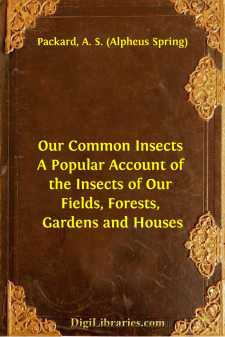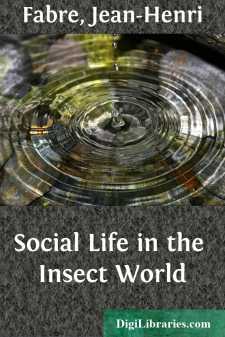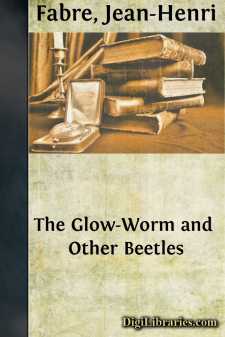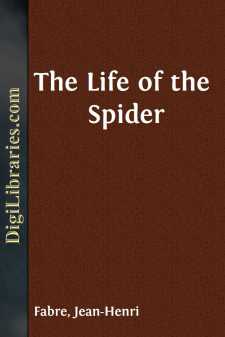Nature
- Animals 47
- Birds & Birdwatching 41
- Dinosaurs & Prehistoric Creatures 1
- Flowers 5
- General 32
- Horses 6
- Insects & Spiders
- Mammals 7
- Mushrooms 2
- Natural Disasters 6
- Natural Resources 3
- Reptiles & Amphibians 2
- Trees & Forests 10
Insects & Spiders Books
Sort by:
PREFACE. This little volume mainly consists of a reprint of a series of essays which appeared in the "American Naturalist" (Vols. i-v, 1867-71). It is hoped that their perusal may lead to a better acquaintance with the habits and forms of our more common insects. The introduction was written expressly for this book, as well as Chapter XIII, "Hints on the Ancestry of Insects." The...
more...
by:
Jean-Henri Fabre
CHAPTER I THE FABLE OF THE CIGALE AND THE ANT Fame is the daughter of Legend. In the world of creatures, as in the world of men, the story precedes and outlives history. There are many instances of the fact that if an insect attract our attention for this reason or that, it is given a place in those legends of the people whose last care is truth. For example, who is there that does not, at least by...
more...
by:
Thomas Bingley
CHAPTER IV. Uncle Thomas introduces to the Notice of the Young Folks the Ettrick Shepherd's Stories about Sheep; and tells them some Interesting Stories about the Goat, and its Peculiarities. "I dare say, Boys, you have not forgotten the Ettrick Shepherd's wonderful stories about his dogs. Some of those which he relates about sheep are equally remarkable, and as he tells them in the same...
more...
by:
Jean-Henri Fabre
CHAPTER ITHE GLOW-WORM Few insects in our climes vie in popular fame with the Glow-worm, that curious little animal which, to celebrate the little joys of life, kindles a beacon at its tail-end. Who does not know it, at least by name? Who has not seen it roam amid the grass, like a spark fallen from the moon at its full? The Greeks of old called it [Greek: lampouris], meaning, the bright-tailed....
more...
Our Pretty Dragon Flies Come, children; come with me. Come to a pond I know of. See how the water shines in the sun. Over there is an old log lying on the edge of the pond. It is covered with green moss, and a green frog is sitting on one end of it. Let us go and sit on the other end. Goop! he says, and—plump! he has jumped into the water. That is too bad, frog; we did not mean to disturb you. How...
more...
LET us now, in order to form a clearer conception of the bees' intellectual power, proceed to consider their methods of inter-communication. There can be no doubting that they understand each other; and indeed it were surely impossible for a republic so considerable, wherein the labours are so varied and so marvellously combined, to subsist amid the silence and spiritual isolation of so many...
more...
by:
Jean-Henri Fabre
CHAPTER I: THE BLACK-BELLIED TARANTULA The Spider has a bad name: to most of us, she represents an odious, noxious animal, which every one hastens to crush under foot. Against this summary verdict the observer sets the beast’s industry, its talent as a weaver, its wiliness in the chase, its tragic nuptials and other characteristics of great interest. Yes, the Spider is well worth studying, apart...
more...
Among the manifold operations of living creatures few have more strongly impressed the casual observer or more deeply interested the thoughtful student than the transformations of insects. The schoolboy watches the tiny green caterpillars hatched from eggs laid on a cabbage leaf by the common white butterfly, or maybe rears successfully a batch of silkworms through the changes and chances of their...
more...
by:
Jean-Henri Fabre
CHAPTER 1. THE HARMAS. This is what I wished for, hoc erat in votis: a bit of land, oh, not so very large, but fenced in, to avoid the drawbacks of a public way; an abandoned, barren, sun-scorched bit of land, favoured by thistles and by Wasps and Bees. Here, without fear of being troubled by the passers-by, I could consult the Ammophila and the Sphex (two species of Digger-or...
more...










